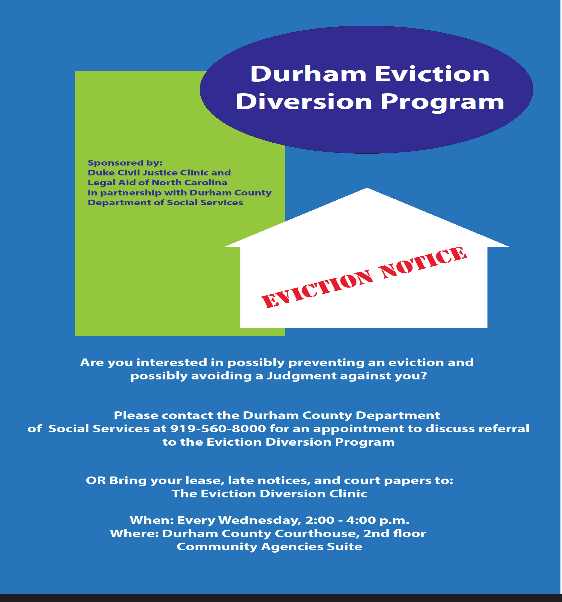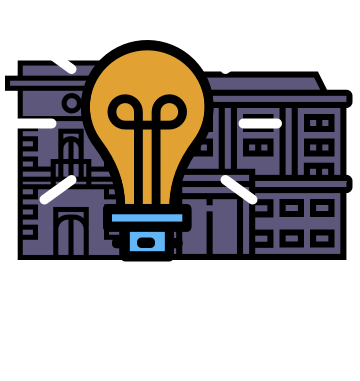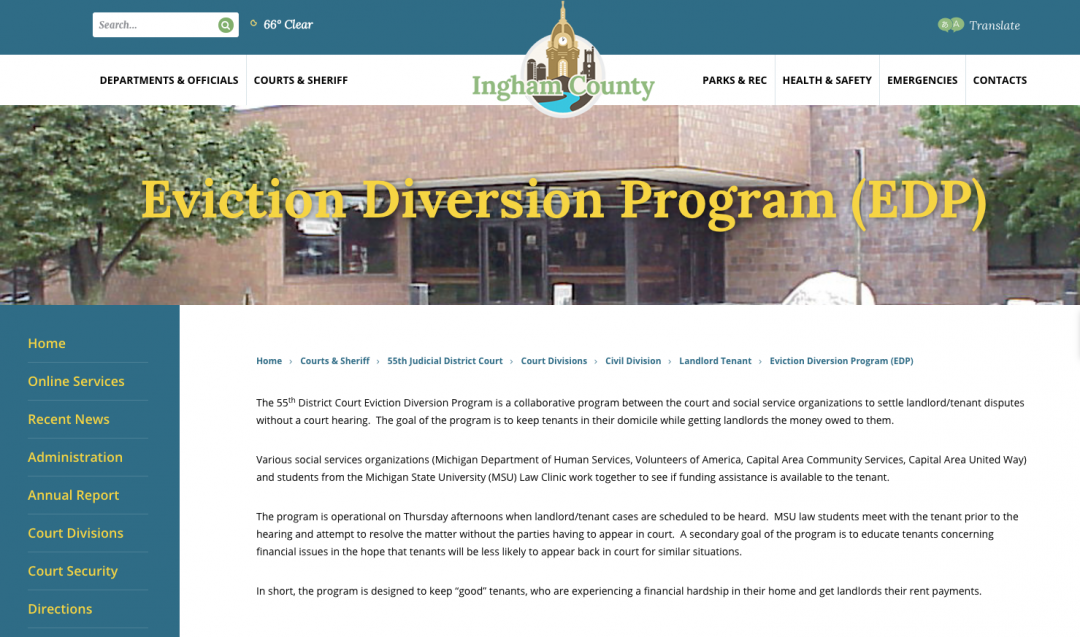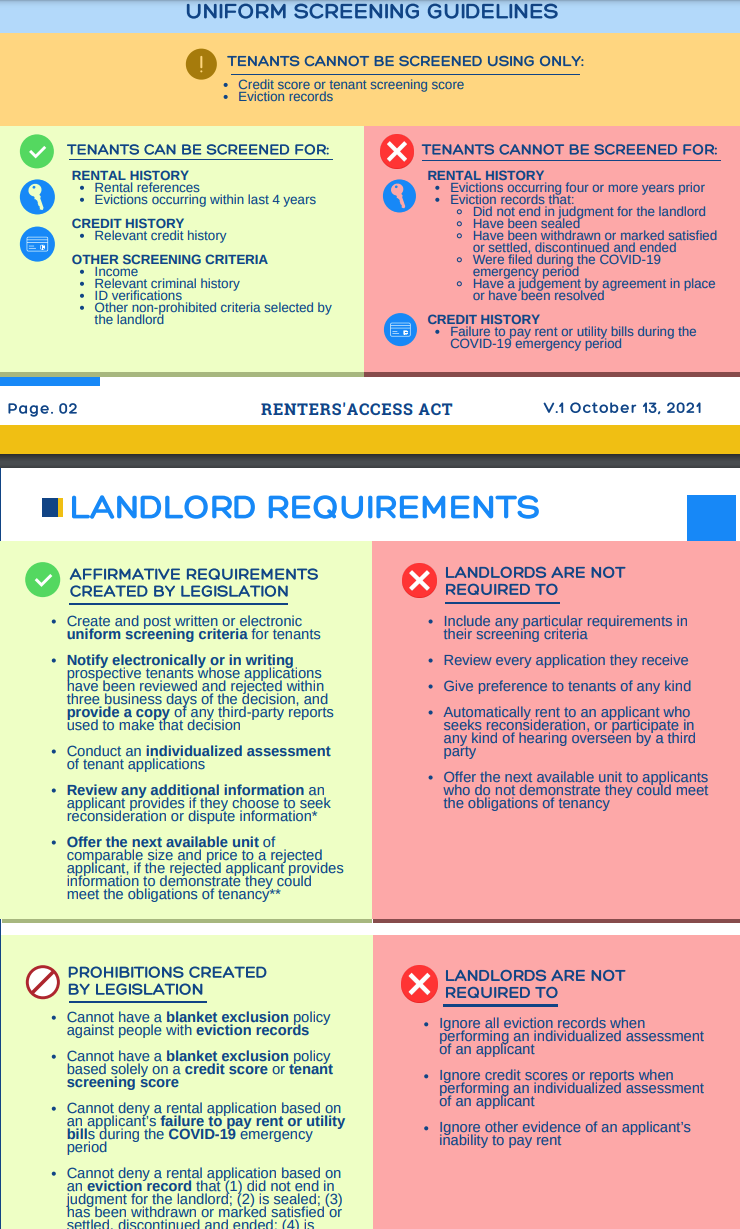Basic Information
| Program name | Durham Eviction Diversion Program |
| Short description of program | This program provides individuals facing eviction with free advice and support, ranging from emergency financial aid to legal council, with the goal of helping citizens avoid eviction judgements and decreasing the number of eviction filings and verdicts in Durham County |
| Location | Durham, North Carolina |
| Duration | 09/2017-present |
| Funding | The program currently receives $320,000 for salaries of LANC attorneys and paralegal and $190,00 for emergency rental assistance fund, annually |
| Size | Approximately 1,200 beneficiaries since program initiation |
Stakeholders
| Who designed and set-up the program? | The Duke Civil Justice Clinic initially investigated the program. They then contacted Legal Aid of North Carolina, with whom they were already working closely on housing cases, and designed and developed the Durham Eviction Diversion Program as a joint program |
| Who runs and manages the program? | Duke Civil Justice Clinic and Legal Aid of North Carolina jointly administer the program, in cooperation with the Durham County Department of Social Services. Legal Aid of North Carolina supplies 4 attorneys and 1 paralegal dedicated to the program, while the Duke Civil Justice Clinic supplies 0.5 attorneys and 8-10 law students (who work on a variety of civil cases including evictions) |
| Who funds the program? How much funding has been received, and what is the sustainability plan for the funding? | City of Durham funds $200,000. Legal Aid of North Carolina funds $120,000. County of Durham funds $190,000 for emergency rental assistance fund. City of Durham has promised to increase funding to $500,000, with Legal Aid of North Carolina match of $220,000, to double the Legal Aid of North Carolina staff committed to this program for 2020. All funding is annual and must be re-approved each year |
| Who does the program target? | The program targets individuals that are threatened with eviction, after an action has been filed in court. |
Program Details
| Describe how the program works, tracing a typical beneficiary’s progress through the program. | An informational flyer about the program is sent to every tenant which each eviction summons that they are served. Tenants are directed to contact the Durham County Department of Social Services about participating in the program. The Department of Social Services refers tenants to the program. Legal Aid of North Carolina receives and screens referred applicants. Applicants either receive legal support from Legal Aid of North Carolina or the Duke Civil Justice Clinic. Attorneys work closely with applicants and negotiate with their landlords to resolve the eviction proceeding. This support may involve, but is not limited to, negotiation of a move-out date or representation litigation. Most cases resolve in settlement with tender of rent or a move-out agreement with dismissal of the case. |
| What assets can be shared for others to use? | See the Durham Eviction Program PowerPoint in Google Drive form more information. |

Evidence Base
| What are the plans for monitoring and evaluation? Include any information on key indicators. | Key indicators are percentage of cases where evictions avoided (averaging approx. 80 %) and move-outs avoided (approximately 66%) |
| Have any evaluations been conducted so far ? | Data collected in Q1 of 2019 shows 151 files were opened (76% women, 87% black). 77 files were closed (with 73% of families not forced to move due to court order or settlement agreement; 69% of clients avoided an eviction judgement) See a public policy thesis by Riley Foster on Durham County program outcomes from April 2018 |
Contact and Follow-up Info
| Program website | None currently |
| Documents and Media Coverage | https://drive.google.com/file/d/1g8cGvWufOjOFKVWbBtOjl5GmvWIFypi6/view?usp=sharing Politico article 2018 on the Durham program Riley Foster 2018 public policy thesis on the program, UNC Chapel Hill |
| Point of contact for more information | Charles Holton, Director of Duke’s Civil Justice Clinic; Peter Gilbert, Supervising Attorney at Legal Aid of North Carolina |


